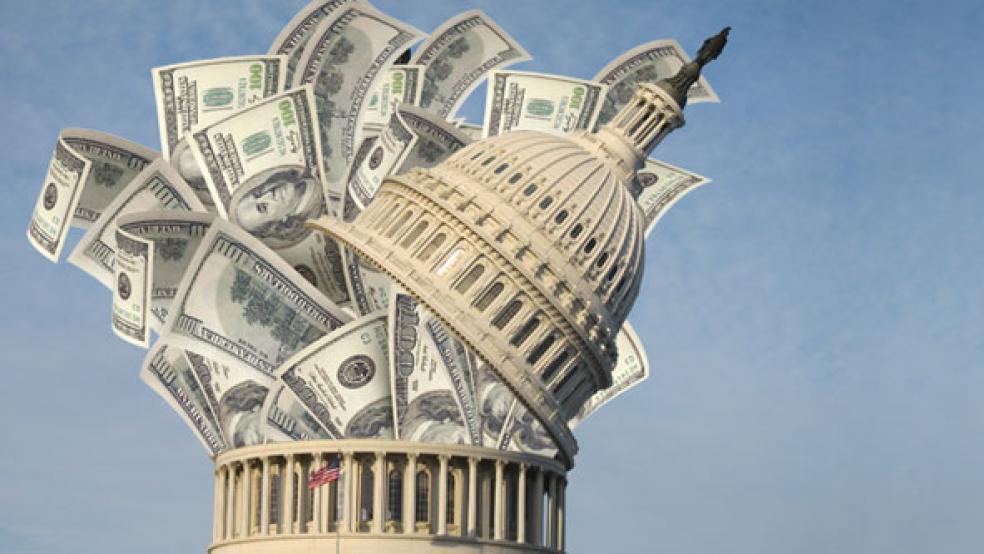Medicare’s Private Fee-For-Service Plans, just one of the many entitlement programs run by the Centers for Medicare and Medicaid Services, overpaid billers by $34.6 billion dollars in 2013, according to its own estimates. With an “improper payments” rate of 10.1 percent of outlays, Medicare FFS is one of numerous government programs that wastes tens of billions of taxpayer dollars annually yet does little to recover any of that cash.
The agency’s contractors are reasonably good at recouping overpayments when they are identified. They had an 83 percent recovery rate in 2013, according to the annual report released by the Department of Health and Human Services. The problem is that CMS only identifies 0.1 percent of improper payments every year – about one one-thousandth of the total.
Related: Feds Blow $100 Billion Annually on Incorrect Payments
When talking about the amount of money the federal government pays out every year, numbers sometimes begin to lose their meaning. So here’s some perspective:
The $34.6 billion the FFS program overpaid to providers in fiscal 2013 was almost equal to the entire budget of the Department of Justice or the Department of Energy. It was significantly more than the budgets of a number of cabinet-level agencies, including the Department of the Interior, the Department of Commerce, and the Environmental Protection Agency.
In fact, for the price of what the FFS plans wasted in 2013, Congress could have funded the Commerce Department, the EPA, all of the Army Corps of Engineers’ civil works projects, and the National Science Foundation combined, and still had a billion dollars left over.
And that’s just one of the programs overseen by CMS. Medicare parts C and D, and Medicaid together added another $21 billion in overpayments in 2013, which would have funded the National Aeronautics and Space Administration as well as all of last year’s disaster relief spending, with another extra billion left over.
Related: Congress is Likely to Pass $1 Trillion Spending Bill Without Reading It
Congress has, for several years, been trying to get a handle on the improper payments made by federal agencies. As part of that effort, it requires most agencies to assess their payments procedures and deliver the results as part of their annual financial reports.
One of the most vocal members of congress on the issue of improper payments has been Delaware Sen. Tom Carper, the Democrat who chairs the Senate Committee on Homeland Security and Governmental Affairs.
In a statement delivered to The Fiscal Times via email, Carper said, “Unfortunately, overpayments are a problem we see in agencies across the federal government. Fortunately, a number of those agencies, including the Centers for Medicare and Medicaid Services, have begun to put in place methods and rules for recovering overpayments.
“While recovering overpayments is a critical step, it is just as important that federal agencies prevent overpayments in the first place and avoid the so-called ‘pay and chase,’” he continued. “With the passage of new laws to curb and recover improper payments, agencies now have better tools to both prevent and recover improper payments."
Related: Government Blatantly Wastes $30 billion This Year
Preventing overpayments in the first place is, of course, an important goal. But with a recovery rate of 83 percent, it might be hard for most voters to understand why more effort isn’t put toward recovering improper payments once they’ve been made.
THE TEST SAMPLE
At CMS, the FFS program is subjected to the agency’s Comprehensive Error Rate Testing (CERT) program, which looks at a random sampling of payments every year, and uses the result to make a statistical projection of errors in the program as a whole.
A side-effect of the CERT program is that it identifies specific overpayments within the random sample, which can then be recovered. The CERT review of FFS for 2013 found $40 million in improper over-payments. Medicare Administrative Contractors recovered $33.2 million of that money for the government.
However, the random sample examined by CERT makes up only a tiny proportion of the plans’ overall error rate. The $40 billion in overpayments it identified is roughly 0.1 percent — one one-thousandth — of the total $34.6 billion in overpayments. Applied to the total estimated overpayment amount, that 83 percent rate means CMS is leaving $28.7 billion on the table every year for FFS alone.
Again, that’s only one of many programs run by one of many departments of the federal government. An article in The Fiscal Times last week pointed out that just 13 of the largest programs administered by the government waste more than $100 billion in improper payments annually.
With hundreds of billions of dollars being paid out improperly every year, it certainly seems cost-effective – at least in programs -- to increase audit rates and identify more overpayments.
83 percent of them would fund a lot of programs – or save a lot of money.
Follow Rob Garver on Twitter @rrgarver
Top Reads from The Fiscal Times:





